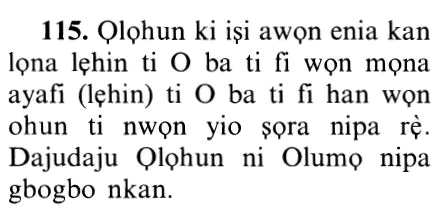9vs115
Select any filter and click on Go! to see results
وَمَا كَانَ اللّهُ لِيُضِلَّ قَوْماً بَعْدَ إِذْ هَدَاهُمْ حَتَّى يُبَيِّنَ لَهُم مَّا يَتَّقُونَ إِنَّ اللّهَ بِكُلِّ شَيْءٍ عَلِيمٌ
Wama kana Allahu liyudilla qawman baAAda ith hadahum hatta yubayyina lahum ma yattaqoona inna Allaha bikulli shayin AAaleemun
Index Terms
Click to play
Yoruba Translation

Hausa Translation
Kuma Allah bai kasance mai ɓatar da mutãne a bãyan Yã shiryar da su ba, sai Ya bayyanã musu abin da zã su yi taƙawa da shi. Lalle ne Allah, ga kõme, Masani ne.
Asbabu n-Nuzuul (Occasions of Revelation)
Recompense comes after Proof is established
Allah says;
وَمَا كَانَ اللّهُ لِيُضِلَّ قَوْمًا بَعْدَ إِذْ هَدَاهُمْ حَتَّى يُبَيِّنَ لَهُم مَّا يَتَّقُونَ إِنَّ اللّهَ بِكُلِّ شَيْءٍ عَلِيمٌ ﴿١١٥﴾
And Allah will never lead a people astray after He has guided them until He makes clear to them what they should avoid. Verily, Allah is the All-Knower of everything.
Allah describes His Honorable Self and just judgment in that He does not lead a people astray but after the Message comes to them, so that the proof is established against them.
For instance, Allah said,
وَأَمَّا ثَمُودُ فَهَدَيْنَـهُمْ
And as for Thamud, We showed and made clear to them the path of truth ... (41:17)
Mujahid commented on Allah's saying; وَمَا كَانَ اللّهُ لِيُضِلَّ قَوْمًا بَعْدَ إِذْ هَدَاهُمْ (And Allah will never lead a people astray after He has guided them),
"Allah the Mighty and Sublime is clarifying to the believers about not seeking forgiveness for the idolators in particular, and in general, it is an exhortation to beware of disobeying Him, and encouragement to obey Him. So either do or suffer.''
Ibn Jarir commented,
"Allah says that He would not direct you to misguidance, so that you invoke Him for forgiveness for your dead idolators, after He gave you guidance and directed you to believe in Him and in His Messenger!
First, He will inform you of what you should avoid, so that you avoid it. Before He informs you that this action is not allowed, you would not have disobeyed Him and fallen into what He prohibited for you (if you indulge in this action). Therefore, in this case, He will not allow you to be misguided. Verily, guidance or misguidance occurs after commands and prohibitions are established.
As for those who were neither commanded nor prohibited, they can neither be obedient nor disobedient in doing what they were neither ordered nor prohibited from doing.''
يقول تعالى مخبرا عن نفسه الكريمة وحكمه العادل إنه لا يضل قوما إلا بعد إبلاغ الرسالة إليهم حتى يكونوا قد قامت عليهم الحجة كما قال تعالى " فأما ثمود فهديناهم " الآية وقال مجاهد في قوله تعالى " وما كان الله ليضل قوما بعد إذ هداهم " الآية . قال بيان الله عز وجل للمؤمنين في ترك الاستغفار للمشركين خاصة وفي بيانه لهم في معصيته وطاعته عامة فافعلوا أو ذروا , وقال ابن جرير يقول الله تعالى وما كان الله ليقضي عليكم في استغفاركم لموتاكم المشركين بالضلال بعد إذ رزقكم الهداية ووفقكم للإيمان به وبرسوله حتى يتقدم إليكم بالنهي عنه فتتركوا فأما قبل أن يبين لكم كراهة ذلك بالنهي عنه فلم تضيعوا نهيه إلى ما نهاكم عنه فإنه لا يحكم عليكم بالضلال فإن الطاعة والمعصية إنما يكونان من المأمور والمنهي وأما من لم يؤمر ولم ينه فغير كائن مطيعا أو عاصيا فيما لم يؤمر به ولم ينه عنه .
"وما كان الله ليضل قوما بعد إذ هداهم" للإسلام "حتى يبين لهم ما يتقون" من العمل فلا يتقوه فيستحقوا الإضلال "إن الله بكل شيء عليم" ومنه مستحق الإضلال والهداية
أي ما كان الله ليوقع الضلالة في قلوبهم بعد الهدى حتى يبين لهم ما يتقون فلا يتقوه فعند ذلك يستحقون الإضلال . قلت : ففي هذا أدل دليل على أن المعاصي إذا ارتكبت وانتهك حجابها كانت سببا إلى الضلالة والردى وسلما إلى ترك الرشاد والهدي . نسأل الله السداد والتوفيق والرشاد بمنه .
I'raab - grammatical analysis of the Qur'an
«وَما» الواو استئنافية وما نافية.
«كانَ اللَّهُ» لفظ الجلالة اسمها والجملة مستأنفة.
«لِيُضِلَّ قَوْماً» اللام لام الجحود ومضارع منصوب بأن المضمرة وقوما مفعول به والفاعل مستتر.
«بَعْدَ» ظرف زمان متعلق بيضل.
«إِذْ» ظرف مضاف إلى بعد.
«هَداهُمْ» ماض ومفعوله والفاعل مستتر والجملة في محل جر بالإضافة.
«حَتَّى» حرف غاية وجر.
«يُبَيِّنَ» مضارع منصوب بأن المضمرة بعد حتى والفاعل مستتر.
«لَهُمْ» متعلقان بيبين.
«ما» موصولية مفعول به.
«يَتَّقُونَ» مضارع مرفوع بثبوت النون والواو فاعله والجملة صلة.
«إِنَّ اللَّهَ» إن ولفظ الجلالة اسمها.
«بِكُلِّ» متعلقان بعليم.
«شَيْ ءٍ» مضاف إليه.
«عَلِيمٌ» خبر والجملة مستأنفة.
